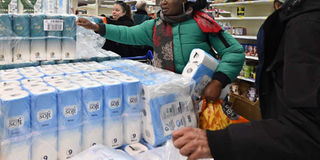Coronavirus: Psychology behind tissue paper buying

Shoppers pick toilet paper. PHOTO | AFP
Sights of shoppers heaping their trolleys with tissue paper as the coronavirus pandemic continues to ravage the world has continued to puzzle many. Just what is the obsession with tissue paper?
Could the symptoms have something to do with the tissue paper craze especially in countries that have witnessed a high number of cases? Nasal congestion, runny nose and cough are some of the known symptoms of the deadly coronavirus. According to the World Health Organization (WHO), some patients have also reported experiencing diarrhoea.
Images of people rushing or even fighting their way through supermarket aisles to grab rolls of toilet paper have been spreading across social media in Kenya, UK, US and Australia as people stock up. It is one of the products disappearing the fastest from supermarket shelves.
The New York Times reported a situation where shoppers had to be limited to two packages of toilet paper each, lest they strip the store bare.
Dr Steven Taylor, author of the 2019 book The Psychology of Pandemics, says it is a psychological response since toilet papers are big and bulky and this is what people notice more in a supermarket. The other reason, he says, is some people don’t want to be left out and so they just buy tissue paper because everyone is buying.
“Fear is very contagious. When people around you happen to buy things that you don’t have in bulk to an extent of fighting for it, you get into panic mode and you feel anxious. We pick up cues from other people,” he says.
Psychologist Mary Alvord, associate professor of Psychiatry and Behavioural Sciences at the George Washington University School of Medicine, says it is triggered by the panic of the notion that people will eat and will, therefore, have to go to the washroom.
“We all eat and we all sleep and we all poop. It’s a basic need to take care of ourselves. With coronavirus, people are being told to be clean,” she says. Tissue paper is a symbol of cleanliness.
Psychologist Lambert Oigara tells the HealthyNation that anxiety and uncertainty could make people react hilariously and do unexpected things. “Kenyans, having seen what is happening in other countries, do not want to be left behind. In their mind, they are taking precautions, they are not sure of tomorrow and since they saw people buying and fighting for tissue paper, they consider them essential items,” he says, adding that Kenyans are stocking up on tissue paper to avoid a similar fate.
“This is a knee-jerk reaction. Any situation causing anxiety, affects us all. The fear of the unknown is real. They are doing that in preparation for what they anticipate would happen,” says Mr Oigara.
This typically demonstrates how human beings, for the fear of the unknown, can do unexpected things.
Dr Dimitrios Tsivrikos, an expert in consumer and behavioural science at the University College London, explains the difference between disaster panic and general panic, with toilet paper becoming a symbol of the latter.
“Buying toilet paper is a public health issue; we have no idea about the time. We are waiting for messages from the government to alert people on the situation. This makes people go into panic mode that buys what they need,” he says.
Since toilet paper has a longer shelf life than many food items, people are psychologically drawn to buying it in times of crisis. The bigger the tissue papers are, the more important we think they are. "If we had an international sign for panic it would be a traffic warning sign with a toilet paper roll in the middle,” he adds.
However, in disaster panic, he says, people are aware that something is going to happen and that means they are prepared. “They know what to buy and the quantity since they know how long it is going to take,” says Dr Tsivrikos.


